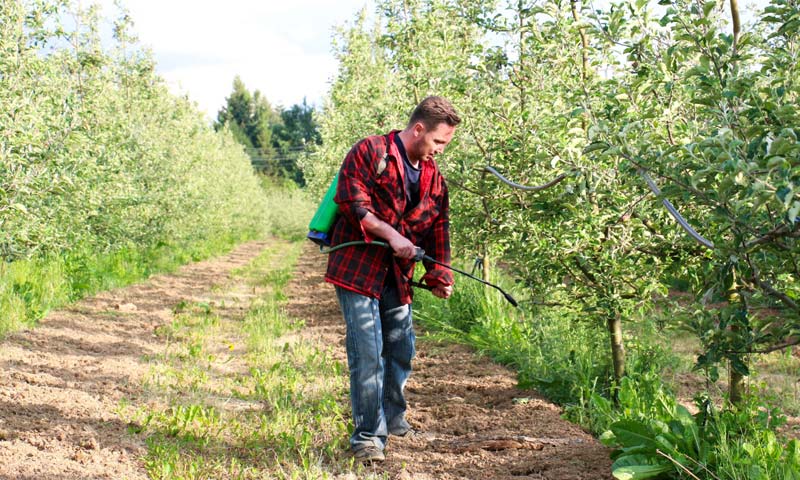
Weed killers are very effective to help your lawn thrive but they may be impacting your life in other ways.
There are many studies that have been done linking weed killers such as Roundup to cancer especially if you’ve been exposed to it for an extended amount of time.
Keeping reading for everything you need to know about weed killer and its links to causing cancer.
The Research
Roundup is a very popular weed killer among many people whether it is for their home use or industrial. Whenever they see any weeds in their yard most people will reach for a bottle of Roundup to take care of the problem quickly. But the main ingredient in Roundup is glyphosate which now has links to cancer.
In March 2019, a jury in San Fransico ordered the maker of Roundup, Monsanto, to pay $80 million to a 70-year-old man with cancer. The jury found that Roundup was a substantial factor to his cancer because he had been using Roundup for nearly three decades on his 56-acres of land.
Even after the verdict, the company insisted that the product was safe and went through rigorous testing for four decades. They said that the verdict should not affect any other trials as they all have their own factual and legal circumstances.
There are currently hundreds of other Roundup lawsuits in the San Fransico federal court.
Glyphosate
Glyphosate is a herbicide and when applied to forestry, lawns, gardens or weeds it helps to control growth. It prevents plants from making the proteins they need to grow.
Nearly two dozen countries have banned the use of glyphosate or restricted its use. Los Angles County has even banned the use of it until they can get more research regarding how it affects health.
Roundup isn’t the only weed killer that has glyphosate. There are actually over 750 products sold in the United States that have glyphosate in them either solid or liquid form. If you want to know if glyphosate is in a product you are interested in buying, then read the label and it will be listed under active ingredients.
Exposure to Glyphosate
It is highly likely that everyone has been exposed to glyphosate because it can be found in water, food, and dust. Food and water are not regularly tested for glyphosate.
It was originally thought that plants were the only thing affected by glyphosate. People who have been heavily exposed to glyphosates such as farmworkers and landscapers have a very high risk of developing non-Hodgkin lymphoma.
What You Should Do
Roundup has been a trusted brand for people involved in the agricultural and floral industries for many years. It is also known as a household product when it comes to yard work. If you have had extended exposure to Roundup and have been diagnosed with non-Hodgkin lymphoma or another form of cancer, then you should file a lawsuit against the company.
If you have done research and talked to your doctor and feel as if your cancer was caused by Roundup, then you should contact The Driscoll Firm P.C. You can contact them at 866-394-9970 to schedule a no-obligation consultation. They have experienced lawyers who can help you get the justice and financial recovery that you deserve.
Exposure to Roundup is normally through aerosol form meaning it was breathed in as it was applied to crops or other plants. You could also come into contact with it through food, water or while cleaning up the weed killer’s chemicals.
There are a number of side effects related to exposure of glyphosate. If you feel that you are a victim, then you should contact a professional to get a medical examination and diagnosis.
The Driscoll Firm P.C. can help you get damages from past and future medical treatments, past and future pain and suffering as a result of your illness or injuries, wage loss, and punitive damages. If someone has died from the effects of Roundup, then you may even be able to file a wrongful death claim.
Should You Keep Using Weed Killers?
When spring comes around you will want to take the best care of your lawn. There is not an easy answer when it comes to deciding if you should continue to use these weed killers. It will depend on several different factors before you can make your final decision.
Obviously, there is a huge debate over products that contain glyphosate on if they are safe or not. The companies who sell these products will fight tooth and nail telling you the products are safe and have gone through rigorous tests. On the other hand, several courts have deemed the products to be unsafe and say they were a huge factor in a person’s illness.
There is currently no agreed-upon level of glyphosate that is safe. Overall, your risk will depend on your exposure to the weed killers.
Some important tips to help reduce exposure would be to read and follow the labels and instructions, wear protective clothing and equipment, and make sure to wash your hands, face, and clothing after using the product.
Always remember to keep children and pets away from the area where you will be using the product. Make sure to close all doors and windows if you are using the product near a home.
Stay Safe
Whether you decide to use products with glyphosate in them like Roundup or not, remember to always take precautions. Wash your hands and take off your shoes before making contact with any other elements.
If you do feel as if you have developed cancer because of this chemical in weed killers, then make sure to contact a lawyer as soon as possible so you can get the compensation that you deserve.
Make sure to leave a comment below and let us know your thoughts and opinions on products that contain glyphosate.







